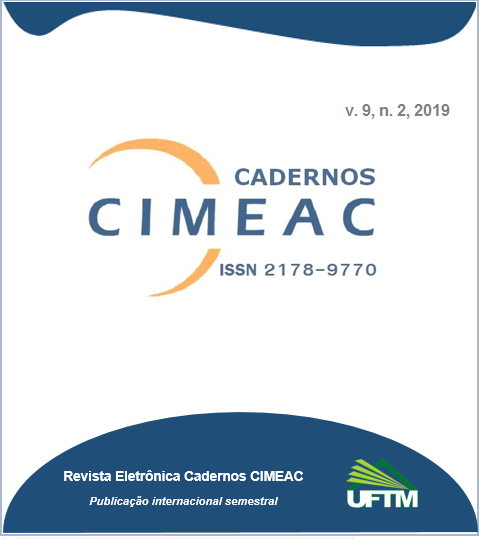Vozes abjetas: a trajetória escolar de um grupo de pessoas transexuais do interior de São Paulo / Abject voices: the school trajectory...
DOI:
https://doi.org/10.18554/cimeac.v9i2.3074Abstract
Vive-se em uma sociedade heteronormativa que discrimina aqueles que rompem com a heterossexualidade e com o binarismo de gênero. A escola, que deveria colaborar na promoção do respeito às diversidades, frequentemente reproduz e produz relação de exclusão daqueles que não coadunam à norma. O presente trabalho tem por objetivo construir compreensões acerca das trajetórias escolares de um grupo de pessoas transexuais do Interior do Estado de São Paulo. Para tanto, utilizou-se uma abordagem qualitativa a partir dos pressupostos da História Oral Temática. Foram realizadas entrevistas abertas, com cinco pessoas transexuais, analisadas a partir do método de Análise Textual Discursiva. Constatou-se que a percepção de anormalidade já experimentada com os cuidadores na família, confirma-se e se fortalece através das vivências escolares. Identificam-se vivências intensas de preconceito e discriminações nas relações com a equipe educativa e colegas, configurando essas pessoas na condição de abjetos. Há, nos relatos, negações de direitos fundamentais, ao longo da vivência escolar, que comprometem a permanência com sucesso e trazem intenso sofrimento psíquico. Por fim, identificam-se várias estratégias e esforços que essas pessoas se utilizaram e empreenderam na busca por aceitação e reconhecimento por parte de educadores e colegas.
Palavras-chave: Pessoas transexuais; Abjeção; Gênero; Escola.
ABSTRACT: It lives in a heteronormative society that discriminates against those who break with heterosexuality and with gender binarism. The school, which should collaborate in promoting respect for diversity, often reproduces and produces exclusionary relationships from those who do not conform to the norm. The present work aims to build understanding about the school trajectories of a group of transsexual people from the State of São Paulo. For that, a qualitative approach was used based on the assumptions of Oral Thematic History. Open interviews were conducted with a group of transsexual people, analyzed using the Discursive Textual Analysis method. It was observed that the perception of abnormality already experienced with caregivers in the family is confirmed and strengthened through school experiences. We identify intense experiences of prejudice and discrimination in relations with the educational team and colleagues, configuring these people as abject. There are, in the reports, denials of fundamental rights, throughout the school experience, that compromise the permanence with success and bring intense psychic suffering. Finally, we identify several strategies and efforts that these people have used and undertaken in the search for acceptance and recognition by educators and colleagues.
Keywords: Transsexual people; Abjection; Gender; School.
Downloads
Published
Issue
Section
License
Os autores que publicam nesta revista concordam com os seguintes termos:
(a) Não cobramos dos autores para a publicação neste periódico.
(b) Autores mantém os direitos autorais e concedem à revista o direito de primeira publicação, com o trabalho simultaneamente licenciado sob a Licença Creative Commons que permite o compartilhamento do trabalho com reconhecimento da autoria e publicação inicial nesta revista.
(c) Autores têm permissão e são estimulados a difundir e a distribuir a versão publicada de seu trabalho online (ex.: em repositórios institucionais ou na sua página pessoal) após o processo editorial, já que isso pode aumentar o impacto e a citação do trabalho publicado (Veja O Efeito do Acesso Livre).
* * *
AUTHORS COPYRIGHT AND PUBLISHING RIGHTS
Authors who publish with this journal agree to the following terms:
(a) This journal does not charge authors for publication.
(b) Authors retain copyright and grant the journal right of first publication with the work simultaneously licensed under a Creative Commons Attribution License that allows others to share the work with an acknowledgement of the work's authorship and initial publication in this journal.
(c) For authors whose articles have been accepted: authors are permitted and encouraged to post their work online (e.g., in institutional repositories or on their website) after the publication of the text in Cadernos CIMEAC, as it can lead to productive exchanges as well as earlier and greater citation of published work (See The Effect of Open Access).

 10.18554/cimeac
10.18554/cimeac

